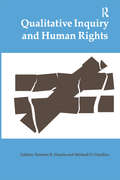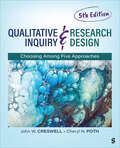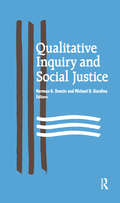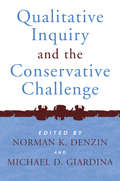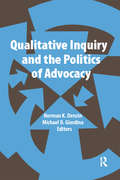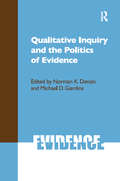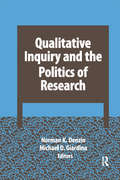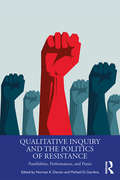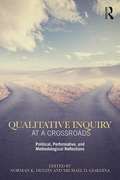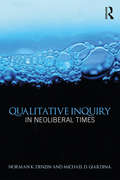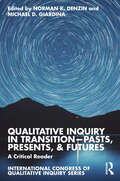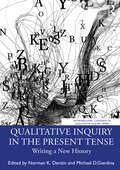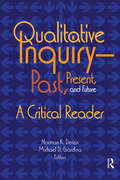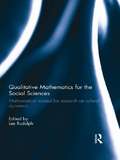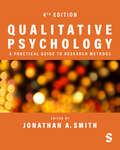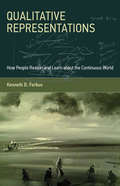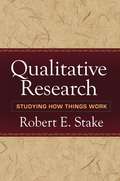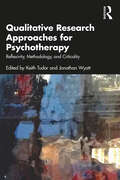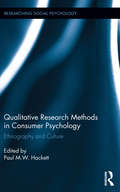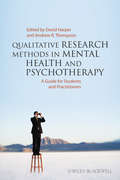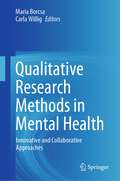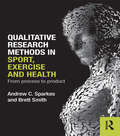- Table View
- List View
Qualitative Inquiry and Human Rights (International Congress of Qualitative Inquiry Series)
by Norman K. Denzin Michael D. GiardinaQualitative researchers are increasingly being called upon to become human rights advocates, to help individuals and communities honor the sanctity of life, and to promote the core values of privacy, justice, freedom, peace, and human dignity. In this volume of plenary papers from the Fifth International of Qualitative Inquiry in 2009, leading qualitative researchers show the various dimensions of the human rights work being done by scholar/activists in the social sciences, education, health care, social services, cultural studies, and other fields.
Qualitative Inquiry and Research Design: Choosing Among Five Approaches
by John W. Creswell Cheryl N. PothIn the Fifth Edition of the bestselling text Qualitative Inquiry and Research Design: Choosing Among Five Approaches, John W. Creswell and Cheryl N. Poth guide researchers in selecting the best option for their studies by exploring, evaluating, and applying five qualitative research approaches: narrative research, phenomenology, grounded theory, ethnography, and case study. For each of these qualitative inquiry traditions, the authors explore the philosophical underpinnings, history, defining features, common data procedures, and writing structures. With expanded content reflecting technological developments in the qualitative research process, more inclusivity and diversity in examples, and updated references, the Fifth Edition is an ideal introduction to the theories, strategies, and practices of qualitative research. Winner of the 2018 Textbook & Academic Authors Association′s The McGuffey Longevity Award Included with this title: LMS Cartridge: Import this title’s instructor resources into your school’s learning management system (LMS) and save time. Don’t use an LMS? You can still access all of the same online resources for this title via the password-protected Instructor Resource Site. Learn more.
Qualitative Inquiry and Research Design: Choosing Among Five Approaches
by John W. Creswell Cheryl N. PothIn the Fifth Edition of the bestselling text Qualitative Inquiry and Research Design: Choosing Among Five Approaches, John W. Creswell and Cheryl N. Poth guide researchers in selecting the best option for their studies by exploring, evaluating, and applying five qualitative research approaches: narrative research, phenomenology, grounded theory, ethnography, and case study. For each of these qualitative inquiry traditions, the authors explore the philosophical underpinnings, history, defining features, common data procedures, and writing structures. With expanded content reflecting technological developments in the qualitative research process, more inclusivity and diversity in examples, and updated references, the Fifth Edition is an ideal introduction to the theories, strategies, and practices of qualitative research. Winner of the 2018 Textbook & Academic Authors Association′s The McGuffey Longevity Award Included with this title: LMS Cartridge: Import this title’s instructor resources into your school’s learning management system (LMS) and save time. Don’t use an LMS? You can still access all of the same online resources for this title via the password-protected Instructor Resource Site. Learn more.
Qualitative Inquiry and Social Justice: Toward a Politics of Hope (International Congress of Qualitative Inquiry Series)
by Norman K Denzin Michael D GiardinaIn increasing numbers, qualitative researchers are leaving their ivory tower perches and entering the fray, focusing their research and actions on the promotion of social justice. In this tightly edited volume of original articles stemming from the 2008 International Congress on Qualitative Inquiry, leading figures in qualitative research demonstrate the potential for the research tradition to make contributions to the betterment of humankind.
Qualitative Inquiry and the Conservative Challenge (International Congress of Qualitative Inquiry Series)
by Norman K. Denzin Michael D. GiardinaThis volume is a call to qualitative researchers to respond to the political and methodological conservativism of the new millennium. Based upon the plenary papers at the first International Congress on Qualitative Inquiry, 22 scholars from five countries and many academic disciplines address how qualitative inquiry can maintain its forward-looking agenda, its emphasis on ethical practice, and its stance in favor of social justice in a world where conservatives aggressively control the political system, the university, and grant agency purse strings. Contributions by such noted scholars as Patti Lather, Janice Morse, Linda Tuhiwai Smith, Ernest House, Yvonna Lincoln, and H.L. Goodall, Jr. make this an important benchmark work for all involved in qualitative inquiry.
Qualitative Inquiry and the Politics of Advocacy (International Congress of Qualitative Inquiry Series)
by Norman K. Denzin Michael D. GiardinaThe plenary volume from the Seventh International Congress of Qualitative Inquiry (2011) examines the politics of advocacy and the context in which scholars are encouraged to pursue social justice agendas, be human rights advocates, and do work that honors the core values of human dignity and freedom from fear and violence. Contributions from many of the world's leading qualitative researchers in communications, education, sociology, and related disciplines address topics including community research, transformative education, and researcher ethics, and guide the field toward an engaged, activist research agenda.
Qualitative Inquiry and the Politics of Evidence (International Congress of Qualitative Inquiry Series)
by Norman K. Denzin Michael D. GiardinaWhat is evidence in qualitative inquiry and how is it evaluated? What is true or false in research is strongly influenced by socially defined criteria and by the politics of academia. In providing an alternative to conservative science, qualitative researchers are often victimized by these politics. The use of qualitative evidence within the policy arena is also subject to social and political factors. Within qualitative inquiry itself, evidence is defined differently in different discourses—law, medicine, history, cultural, or performance studies. The interdisciplinary, international group of contributors to this volume address these questions in an attempt to create evidential criteria for qualitative work. Sponsored by the International Center for Qualitative Inquiry.
Qualitative Inquiry and the Politics of Research (International Congress of Qualitative Inquiry Series #10)
by Norman K Denzin Michael D GiardinaThis volume of plenary addresses and other key presentations from the 2014 International Congress of Qualitative Inquiry highlights the politics of research in the neoliberal state and the role of qualitative researchers in that debate. Marginalized by an increasingly top-down, assessment-driven university system, the fifteen contributors from a variety of disciplines show the responses of qualitative scholars in their research, writing, advocacy, and teaching, both inside the university and in the broader society. Sponsored by the International Congress of Qualitative Inquiry.
Qualitative Inquiry and the Politics of Resistance: Possibilities, Performances, and Praxis (International Congress of Qualitative Inquiry Series)
by Norman K. Denzin Michael D. GiardinaWe are global citizens trapped in a world we did not create. Our public institutions are under assault. Academics, media members, and everyday folks critical of the shifting public order are branded as "enemies of the state" by right-wing media and elected officials alike. Qualitative Inquiry and the Politics of Resistance takes as its mandate foregrounding, interrogating, imagining, and engaging in new ways of doing critical qualitative inquiry in these troubling times. Internationally renowned contributors write to resist, to celebrate community, to experiment with traditional and new methodologies, and to advance new ontologies and materialities. Together they seek to develop new understandings and exemplars concerning advocacy, inquiry, and social justice concerns. And they share a commitment to change the world, to engage in ethical work that makes a positive difference. Topics include: embodiment, subjectivity, border crossing, positionality, praxis, and performance, as they relate to multiple understandings of resistance. To that end, this book represents part of a global project committed to a politics of active and passive resistance. It is a politics of non-violence: one that bears witness to injustice; that refuses to be silenced or accept assaults on critical, interpretive inquiry; and ultimately refuses to abandon the goal of social justice for all.
Qualitative Inquiry at a Crossroads: Political, Performative, and Methodological Reflections (International Congress of Qualitative Inquiry Series)
by Norman K. Denzin Michael D. GiardinaQualitative Inquiry at a Crossroads critically reflects on the ever-changing dynamics of qualitative research in the contemporary moment. We live at a crossroads in which the spaces for critical civic discourse are narrowing, in which traditional political ideologies are now questioned: there is no utopian vision on the horizon, only fear and doubt. The moral and ethical foundations of democracy are under assault, global inequality is on the rise, facts are derided as ‘fake news’—an uncertain future stands at our door. Premised on the belief that our troubled times call for a critical inquiry that matters—a discourse committed to a politics of resistance, a politics of possibility—leading international contributors from the United States, United Kingdom, Australia, Spain, Norway, and Denmark present a range of perspectives, challenges, and opportunities for the field. In so doing, they wrestle with questions concerning the intersecting vectors of method, politics, and praxis. More specifically, contributors engage with issues ranging from indigenous and decolonizing methods, arts-based research, and intersectionality to debates over the research marketplace, accountability metrics, and emergent forays into post-qualitative inquiry.
Qualitative Inquiry in Neoliberal Times (International Congress of Qualitative Inquiry Series)
by Norman K. Denzin Michael D. GiardinaQualitative Inquiry in Neoliberal Times is written from the perspective that the scholarly lives of academics are changing, constantly in flux, and increasingly bound to the demands of the market – a context in which the university has increasingly morphed into a business enterprise, one that treats students as consumers to be marketed to, education as something to be purchased, and research as something to be capitalized on for financial gain. The effects of this market-orientation of scholarly life, especially on those in the social sciences and humanities, are ones that demand serious examination. At the same time, qualitative inquiry itself is changing and evolving within and against the rhythms of this ‘new normal’. This volume engages with these emerging debates in qualitative research over new materialism, 'data', public policy, research ethics, public scholarship, and the corporate university in the neoliberal age. World-renowned contributors from the United States, United Kingdom, Spain, Norway, Australia, and New Zealand present a global perspective on these issues, framed within a landscape of higher education marked if not marred by efficiency metrics, accountability, external funding, and university rankings. Qualitative Inquiry in Neoliberal Times is a must-read for faculty and students alike interested in the changing dynamics of their profession, whether theoretically, methodologically, or structurally and materially. This title is sponsored by the International Association of Qualitative Inquiry, a major new international organization that sponsors an annual congress.
Qualitative Inquiry in Transition—Pasts, Presents, & Futures: A Critical Reader (International Congress of Qualitative Inquiry Series)
by Norman K. Denzin Michael D. GiardinaQualitative Inquiry in Transition—Pasts, Presents, & Futures: A Critical Reader gathers more than 30 internationally renowned scholars in qualitative inquiry to present provocative interventions into the politics of research, philosophy of inquiry, justice matters, and writing practices.Drawn from a decade of cutting-edge plenary volumes emanating from the annual International Congress of Qualitative Inquiry, these contributors and their chapters represent the leading edge of scholarship that has pushed the field forward over the last decade. Topics discussed include the research marketplace, data entanglements, the neoliberal university, Indigenous methodologies, slow research, performative ethics, intersectionality, civically engaged research, post-qualitative inquiry and the new materialisms, collaborative research, poetic inquiry, academic writing, and the future of the field. These and other topics comprise a moving—rather than static—center to the field, one that moves across contexts and ontologies, moves between agreement and disagreement, forges new collaborations, and informs new inter- and trans-disciplinary approaches to research.Qualitative Inquiry in Transition—Pasts, Presents, & Futures: A Critical Reader will be required reading for those seeking to understand where the field of qualitative inquiry has been and will look to go in the years to come.
Qualitative Inquiry in the Present Tense: Writing a New History (International Congress of Qualitative Inquiry Series)
by Norman K. Denzin Michael D. GiardinaIn Qualitative Inquiry in the Present Tense, contributors engage with epistemological and philosophical questions concerning the conduct of qualitative inquiry in the present moment, and especially as it relates to various understandings of writing in/as inquiry.Topics addressed include methodological processes, questions of narrative uprootedness, relational inquiry, Indigenous ethico-onto-epistemologies, storytelling, and transformative writing forms and practices. This is a messy, often unruly collection (in the best way possible) of disparate ideas strung tightly together by literal and metaphorical questions of the research act of writing. Contributors from the United States, Australia, Canada, England, and Scotland imaginatively conceive of new qualitative futures—and how we might write ourselves there.This evocative new book is a must-read for faculty and students alike who are interested in and engaged with questions and ideas oriented toward understanding our current historical present in qualitative research—a moment in which the field is perpetually in motion or in flux, with new theories, methods, and orientations arising, competing, and even contradicting one another.
Qualitative Inquiry—Past, Present, and Future: A Critical Reader
by Norman K Denzin Michael D GiardinaIn this critical reader, the best writing of two dozen key figures in qualitative research is gathered together to help students to identify emerging themes in the field and the latest thinking of the leaders in qualitative inquiry. These groundbreaking articles are pulled from a decade of social justice-focused plenary volumes emanating from the annual International Congress of Qualitative Inquiry. These are the ideas that have helped shape the landscape of the field over the past decade. This work-brings together the latest work of 25 leading figures in qualitative research from 4 continents;-addresses the central themes of the field over the past decade in theory, methodology, politics, and interventions;-includes contextualizing essays by the volume editors, who direct the Congress.
Qualitative Mathematics for the Social Sciences: Mathematical Models for Research on Cultural Dynamics (Cultural Dynamics of Social Representation)
by Lee RudolphIn this book Lee Rudolph brings together international contributors who combine psychological and mathematical perspectives to analyse how qualitative mathematics can be used to create models of social and psychological processes. Bridging the gap between the fields with an imaginative and stimulating collection of contributed chapters, the volume updates the current research on the subject, which until now has been rather limited, focussing largely on the use of statistics. Qualitative Mathematics for the Social Sciences contains a variety of useful illustrative figures, introducing readers from the social sciences to the rich contribution that modern mathematics has made to our knowledge of logic, structures, and dynamic systems. A beguiling array of conceptual systems, topological models and fractals are discussed which transcend the application of statistics, and bring a fresh perspective to the study of social representations. The wide selection of qualitative mathematical methodologies discussed in this volume will be hugely valuable to higher-level undergraduate and postgraduate students of psychology, sociology and mathematics. It will also be useful for researchers, academics and professionals from the social sciences who want a firmer grasp on the use of qualitative mathematics.
Qualitative Psychology: A Practical Guide to Research Methods
by Jonathan A. SmithUndertaking qualitative research in psychology can seem like a daunting and complex process, especially when it comes to selecting the most appropriate approach for your project. This book provides a comprehensive and practical introduction to the key approaches in qualitative psychology research from a world-leading group of academics and researchers. This Fourth Edition features timely updates that reflect the most current practice in the field. Jonathan A. Smith is Professor of Psychology at Birkbeck University of London.
Qualitative Psychology: A Practical Guide to Research Methods
by Jonathan A. SmithUndertaking qualitative research in psychology can seem like a daunting and complex process, especially when it comes to selecting the most appropriate approach for your project. This book provides a comprehensive and practical introduction to the key approaches in qualitative psychology research from a world-leading group of academics and researchers. This Fourth Edition features timely updates that reflect the most current practice in the field. Jonathan A. Smith is Professor of Psychology at Birkbeck University of London.
Qualitative Representations: How People Reason and Learn about the Continuous World
by Kenneth D. ForbusAn argument that qualitative representations—symbolic representations that carve continuous phenomena into meaningful units—are central to human cognition.In this book, Kenneth Forbus proposes that qualitative representations hold the key to one of the deepest mysteries of cognitive science: how we reason and learn about the continuous phenomena surrounding us. Forbus argues that qualitative representations—symbolic representations that carve continuous phenomena into meaningful units—are central to human cognition. Qualitative representations provide a basis for commonsense reasoning, because they enable practical reasoning with very little data; this makes qualitative representations a useful component of natural language semantics. Qualitative representations also provide a foundation for expert reasoning in science and engineering by making explicit the broad categories of things that might happen and enabling causal models that help guide the application of more quantitative knowledge as needed. Qualitative representations are important for creating more human-like artificial intelligence systems with capabilities for spatial reasoning, vision, question answering, and understanding natural language.Forbus discusses, among other topics, basic ideas of knowledge representation and reasoning; qualitative process theory; qualitative simulation and reasoning about change; compositional modeling; qualitative spatial reasoning; and learning and conceptual change. His argument is notable both for presenting an approach to qualitative reasoning in which analogical reasoning and learning play crucial roles and for marshaling a wide variety of evidence, including the performance of AI systems. Cognitive scientists will find Forbus's account of qualitative representations illuminating; AI scientists will value Forbus's new approach to qualitative representations and the overview he offers.
Qualitative Research
by Robert Stake Janet UsingerThis book provides invaluable guidance for thinking through and planning a qualitative study. Rather than offering recipes for specific techniques, master storyteller Robert Stake stimulates readers to discover "how things work" in organizations, programs, communities, and other systems. Topics range from identifying a research question to selecting methods, gathering data, interpreting and analyzing the results, and producing a well-thought-through written report. In-depth examples from actual studies emphasize the role of the researcher as instrument and interpreter, while boxed vignettes and learning projects encourage self-reflection and critical thinking. Other useful pedagogical features include quick-reference tables and charts, sample project management forms, and an end-of-book glossary. After reading this book, doctoral students and novice qualitative researchers will be able to plan a study from beginning to end.
Qualitative Research Approaches for Psychotherapy: Reflexivity, Methodology, and Criticality
by Keith Tudor Jonathan WyattQualitative Research Approaches for Psychotherapy offers the reader a range of current qualitative research approaches congruent with the values and practices of psychotherapy itself: experience-based, reflective, contextualized, and critical. This volume contains 14 compelling, challenging new essays from authors in both the Northern and Southern hemispheres, writing from a range of theoretical and cultural perspectives. The book covers both established and emerging approaches to qualitative research in this field, beginning with case study, ending with postqualitative, and with hermeneutic, reflexive, psychosocial, Talanoa, queer, feminist, critical race theory, heuristic, grounded theory, authoethnographic, poetic and collaborative writing approaches in between. These chapters introduce and explore the complexity of the specific research approach, its assumptions, challenges, ethics, and potentials, including examples from the authors’ own research, therapeutic practice, and life. The book is not a ‘how to’ guide to methods but, rather, a stimulus for psychotherapy researchers to think and feel their way differently into their research endeavours. This book will be an invaluable resource to postgraduate students, practitioners and established researchers in psychotherapy who are undertaking (or considering) qualitative research for their projects. It will also appeal to course tutors and trainers looking for a volume around which to structure a qualitative research methods course.
Qualitative Research Methods in Consumer Psychology: Ethnography and Culture
by Paul HackettWhile consumer research is founded on traditional quantitative approaches, the insight produced through qualitative research methods within consumer settings has not gone unnoticed. The culturally situated consumer, who is in intimate dialogue with their physical, virtual and social surroundings, has become integral to understanding the psychology behind consumer choices. This volume presents readers with theoretical and applied approaches to using qualitative research methods in ethnographic studies looking at consumer behavior. It brings together an international group of leading scholars in the field of consumer research, with educational and professional backgrounds in marketing, advertising, business, education, therapy and health. Researchers, teaching faculty, and students in the field of consumer and social psychology will benefit from the applied examples of qualitative and ethnographic consumer research this volume presents.
Qualitative Research Methods in Mental Health and Psychotherapy
by David Harper Andrew R. ThompsonThis book provides a user-friendly introduction to the qualitative methods most commonly used in the mental health and psychotherapy arena.Chapters are written by leading researchers and the editors are experienced qualitative researchers, clinical trainers, and mental health practitionersProvides chapter-by-chapter guidance on conducting a qualitative study from across a range of approachesOffers guidance on how to review and appraise existing qualitative literature, how to choose the most appropriate method, and how to consider ethical issuesDemonstrates how specific methods have been applied to questions in mental health researchUses examples drawn from recent research, including research with service users, in mental health practice and in psychotherapy
Qualitative Research Methods in Mental Health: Innovative and Collaborative Approaches
by Maria Borcsa Carla WilligThis book examines innovative approaches to the use of qualitative methods in mental health research. It describes the development and use of methods of data collection and analysis designed. These methods address contemporary and interdisciplinary research questions, such as how to access the voices of vulnerable populations, understand the relationship between experience and discourse, and identify processes and patterns that characterize institutional practices. The book offers insight into projects that reflect various cultural contexts and geographical locations as well as involve diverse research teams, ranging in their methodology from individual case studies to community-based interventions.Chapters address how research method selection needs to be tailored to specific contexts within which studies are carried out and how synthesizing diverse perspectives of different disciplines – such as psychology, sociology, linguistics, history, and art – make a research endeavor more fruitful. The book offers a clear framework in which to assess the research presented in the book as well as map future directions for qualitative methodology in mental health research.Key areas of coverage include projects that describe research with:• Individuals confronted with critical life events.• Former psychiatric patients.• Individual and couple psychotherapy clients.• Clients in a forensic setting.• Persons affected by psychosis.• Dementia patients.• People living with cancer.• Health care professionals. Qualitative Research Methods in Mental Health is a valuable resource for researchers, professors, and graduate students as well as therapists and other professionals in clinical and counseling psychology, psychotherapy, social work, and family therapy as well as all interrelated psychology and medical disciplines.
Qualitative Research Methods in Sport, Exercise and Health: From Process to Product
by Andrew C. Sparkes Brett SmithQualitative forms of inquiry are a dynamic and exciting area within contemporary research in sport, exercise and health. Students and researchers at all levels are now expected to understand qualitative approaches and be able to employ them in their work. In this comprehensive and in-depth introductory text, Andrew C. Sparkes and Brett Smith take the reader on a journey through the entire qualitative research process that begins with the conceptualization of ideas and the planning of a study, moves through the phases of data collection and analysis, and then explains how findings might be represented in various ways to different audiences. Ethical issues are also explored in detail, as well as the ways that the goodness of qualitative research might be judged by its consumers. The book is based on the view that researchers need to make principled, informed and strategic decisions about what, why, when, and how to use qualitative forms of inquiry. The nature of qualitative research is explained in terms of both its core assumptions and what practitioners actually do in the field when they collect data and subject it to analysis. Each chapter is vividly illustrated with cases and examples from published research, to demonstrate different qualitative approaches in action and their relative strengths and weaknesses. The book also extends the boundaries of qualitative research by exploring innovative contemporary methodologies and novel ways to report research findings. Qualitative Research Methods in Sport, Exercise and Health is essential reading for any student, researcher or professional who wishes to understand this form of inquiry and to engage in a research project within a sport, exercise or health context.
Qualitative Research Using Social Media
by Joel Rasmussen Gwen BouvierDo you want to study influencers? Opinions and comments on a set of posts? Look at collections of photos or videos on Instagram? Qualitative Research Using Social Media guides the reader in what different kinds of qualitative research can be applied to social media data. It introduces students, as well as those who are new to the field, to developing and carrying out concrete research projects. The book takes the reader through the stages of choosing data, formulating a research question, and choosing and applying method(s). Written in a clear and accessible manner with current social media examples throughout, the book provides a step-by-step overview of a range of qualitative methods. These are presented in clear ways to show how to analyze many different types of social media content, including language and visual content such as memes, gifs, photographs, and film clips. Methods examined include critical discourse analysis, content analysis, multimodal analysis, ethnography, and focus groups. Most importantly, the chapters and examples show how to ask the kinds of questions that are relevant for us at this present point in our societies, where social media is highly integrated into how we live. Social media is used for political communication, social activism, as well as commercial activities and mundane everyday things, and it can transform how all these are accomplished and even what they mean. Drawing on examples from Twitter, Instagram, YouTube, TikTok, Facebook, Snapchat, Reddit, Weibo, and others, this book will be suitable for undergraduate students studying social media research courses in media and communications, as well as other humanities such as linguistics and social science-based degrees.
